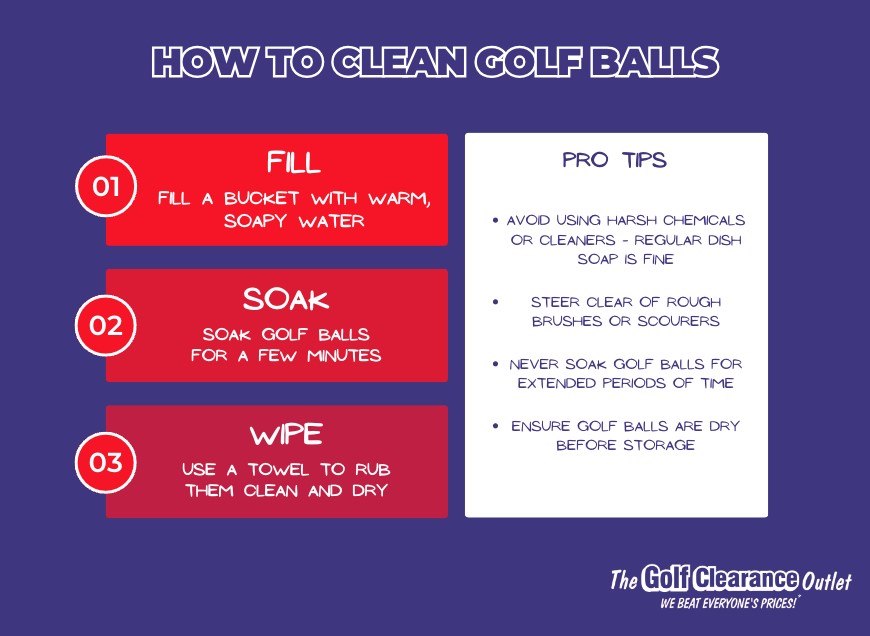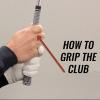How To Clean Golf Balls

If you’re like most golfers, you probably want to serve up your best performance each time you hit the fairways. While you can work on fine-tuning your swing, sharpening those chip shots or practising your putting until the cows come home, there’s another key factor that might be holding you back from fulfilling your potential—the state of your golf gear.
Playing a round of golf with dirty, poorly maintained equipment is like driving a race car with a flat tyre. You might be able to make your way around the course, but it’ll be far from your best performance.
While most golfers know how to clean golf clubs to keep them in tip-top condition, the cleanliness of your golf balls is an equally important factor that shouldn’t be overlooked—but how do you clean golf balls?
In this article, we’ll share with you our valuable insider tips on everything from how to clean golf balls and what to clean golf balls with, to things to avoid when cleaning golf balls and the best way to store golf balls, so you can play at your best, every round.
|
Article Summary: ● Understanding the Necessity: Keeping golf balls clean is important to ensure maximum performance on the course, with a clean ball affecting both the distance and accuracy of shots. ● Cleaning Techniques: Manual cleaning with soap and water is the best approach for most golfers. For a thorough clean, commercial or ultrasonic cleaners can be used. Avoid common cleaning mistakes such as using harsh chemicals or abrasive brushes. ● Frequency and Care: For optimal golf ball maintenance, cleaning is recommended after every game as well as storage in a cool, dry place to prevent damage and prolong their condition over time. |
Why do you need to clean golf balls?
While every golfer understands the value of maintaining their clubs, what’s the point if you're going to use them to hit a dirty golf ball?
Golf is a game of precision that demands accuracy and control in every aspect of play and so many different factors can influence your on-course performance. The cleanliness of your golf ball is one factor that will undoubtedly influence your ability to play at your optimum and get the most out of each round.
Here are some of the ways you’ll benefit from playing with a clean golf ball:
- Optimal Performance: A clean golf ball flies straighter, further and more consistently through the air, allowing for more accurate shots.
- Improved Spin Control: Without dirt or debris on the surface, it's easier to control the trajectory and amount of spin you put on the ball, especially around the greens.
- Better Contact: Clean golf balls provide better contact with the clubface, ensuring that energy transfer is efficient, resulting in more powerful shots.
- Preservation of Equipment: Clean golf balls reduce the risk of dirt or debris transferring to your clubs upon impact, potentially helping to extend the lifespan of your equipment.
- Enhanced Durability: Regular cleaning can help prevent damage to the cover of the golf ball, making it more durable and less prone to scuffs or scratches.
- Psychological Edge: Starting each shot with a clean ball can boost confidence and focus, leading to better performance on the course.
While the cleanliness of your golf ball might not initially seem that important, it does impact your game. Think of your golf balls as your ally—treat them right, and they’ll return the favour on the course!
Best way to clean golf balls

There are plenty of different ideas about what the best way to clean golf balls is, but like most things, the simplest approach is usually the best approach. We’ve found the most effective way to clean your golf balls is simply to use warm soapy water and a microfibre towel.
Here’s what you need to do:
- Fill a bucket or sink with warm water and some mild detergent. Any type of non-abrasive dish soap is fine.
- Place the golf balls in the bucket and let them soak for a few minutes to soften and dislodge any dried-on mud, grass or grime.
- Remove each ball from the water and rub them clean and dry using a soft towel.
This approach is ideal as it’s quick, easy and allows you to give all of your golf balls a good clean all at once. For more stubborn dirt or grime, try soaking them for a little longer (around 20 minutes should be enough) before gently scrubbing them with a soft-bristled brush for a more intensive clean.
Best way to clean golf balls when you’re on the course
Now you’re well-versed on how to clean golf balls when at home, but what should you do when you’re on the course? It’s an unavoidable fact of the game that your golf balls will get wet, dirty or muddy from time to time. While many courses install commercial golf ball cleaners at various locations around the course, they’re not always available.
While there are some rules around when you’re allowed to clean your golf ball, thankfully, it’s not too difficult to give it a quick once over in between holes or when you reach the putting green.
Each time you play, make sure you carry a golf towel with you. When you need to clean your ball, lightly dampen the towel with some water from your drink bottle, then use it to wipe over the surface of the ball to remove any grass and mud. This will ensure you get a nice roll on putts and good flight during full swings.
Alternatively, you could purchase a portable ball cleaner to attach to your golf bag, or the good old ‘spit and polish’ is another easy option. Simply give your thumb a quick lick and gently rub away any dirt or debris before putting.
Alternative ways to clean golf balls
While we’ve found using warm soapy water and a soft towel to be the easiest and best way to clean golf balls, there are a few other methods you can also consider trying.
Diluted vinegar
Vinegar contains acidic and antimicrobial properties which make it an effective, natural cleaning product.
Simply fill a bucket or sink with warm water and 1 cup of vinegar. Allow your golf balls to soak in the solution for around 20-30 minutes, before rinsing them under clean water and drying them with a towel.
Baking soda
Baking soda (or sodium bicarbonate) is another great natural option you could try using.
Start by soaking the golf balls in either a soapy solution (as we’ve described above). Next, make a paste by combining some baking soda with either water or vinegar. Cover the ball with the paste, then scrub the surface of the ball with a towel or brush to target stubborn dirt and stains. Rinse under clean water before drying with a towel.
Denture whitening tablets
The effervescent action and cleaning agents in denture whitening tablets are another method that can help to remove dirt, stains and discolouration from the surface of golf balls.
Prepare the solution by following the instructions on the packet. Give the golf balls a quick soak, before giving them a gentle scrub with a soft-bristle brush. Finish by drying them with a towel.
The dishwasher
Plenty of golfers also swear by using the dishwasher to wash golf balls!
Simply load your golf balls into the top rack of your dishwasher and run a short cycle just as you would normally. Just make sure you wash them separately from your regular dishes.
The washing machine
The laundry washing machine is another household appliance that some golfers believe does a great job cleaning their golf balls.
If you want to give this method a try, place your golf balls in a mesh wash bag to dampen the banging noise (that’s sure to drive you crazy once it reaches the spin cycle!). If you’re concerned about the noise, you could also try stuffing the wash bag inside a pillow case, adding a towel in with the wash or skipping the spin cycle altogether.
Nail polish remover
If you’re struggling to remove more stubborn marks or stains, you can try spot-cleaning with an acetone-based nail polish remover.
Simply dab some nail polish remover on a cotton ball and rub on the mark or spot until it disappears. Remember to rinse the golf ball when finished to remove any residue, before drying with a towel.
What to avoid when cleaning golf balls
While there are many methods you can use to clean golf balls, there are a few things you should try to avoid to ensure you don’t accidentally damage them.
When cleaning golf balls:
- Avoid using harsh chemicals or abrasive cleaners that can damage the surface of the golf ball.
- Avoid using rough brushes or scouring pads that can scratch or scuff the outer layer of the ball.
- Be cautious when using high-pressure water jets, as these can also cause damage to the ball's surface. It's best to stick to gentle cleaning methods to preserve the integrity of the ball.
- Ensure you don’t soak them for prolonged periods. Water may seep in through any micro-cracks in the outer layer of the ball, causing it to become waterlogged.
- Avoid exposing golf balls to extreme temperatures or prolonged sunlight, as this can cause deterioration of the materials over time. Exposure to hot water may also cause the golf ball to expand, affecting its performance.
By avoiding these common pitfalls, you can effectively clean your golf balls while maintaining their performance and appearance for longer.
How often to clean golf balls
How often you should clean your golf balls can vary depending on the playing conditions, course terrain and personal preferences.
It's a good idea to clean your golf balls after every round of play or whenever they become visibly dirty. This ensures that any dirt, grass or debris is removed promptly, ensuring they’re clean and ready for your next round.
If you notice your shots becoming less consistent or the balls feel slippery to the touch, that could be a sign that they need cleaning. Ultimately, regular cleaning helps to maintain the condition and performance of your golf balls, so it's worth incorporating into your regular post-round routine.
How to store golf balls
Just as regular cleaning is important to keep your golf balls in optimal condition, storing golf balls properly is equally as important to maximise the mileage you can get out of them.
Here are some tips on how to store golf balls effectively:
- Keep Them Dry: Moisture can affect the performance and lifespan of golf balls. Store golf balls in a dry, cool place away from humidity, such as a climate-controlled room or a dry cupboard. Avoid storing them in damp areas like basements or garages where moisture can accumulate.
- Protect from Extreme Temperatures: Avoid exposing golf balls to extreme temperatures, which can affect their elasticity and performance. Store them at room temperature and avoid leaving them in direct sunlight or in the trunk of a car on hot days.
- Use a Container or Bag: Consider storing your golf balls in a container or bag to keep them organised and protected from dust, dirt and other contaminants. This can also help prevent them from rolling around and getting damaged.
- Keep Them Separated: While most golfers tend to store all their balls in a single compartment in their golf bag, see if you can separate them to minimise contact and rubbing which could potentially cause damage to the outer layer.
- Rotate Them Regularly: If you have a large supply of golf balls, consider rotating them regularly to ensure they are used evenly. This can help prevent some balls from deteriorating due to prolonged storage while others are in use.
By following these storage tips, you can prolong the lifespan of your golf balls and maintain their performance for longer.
Time to upgrade your golf balls?
Proper and regular cleaning will go a long way to preserve the performance and extend the life of your golf balls, but there will come a time when you need to upgrade to a new set.
Realistically, most golf balls can only be used for a round or two before you’ll start to notice significant scuffs, scratches and cracks that could jeopardise the balls’ performance, signalling it should be demoted to your practice bag.
If you think it’s time to upgrade to a new set, Golf Clearance Outlet has you covered with a great range of cheap golf balls from leading brands.
Enjoy the convenience of shopping our full range of golf balls for sale online, or head into one of our retail stores to experience the range first-hand. We even stock a great range of used golf balls that can be a budget-friendly way to stock up on practice balls.











